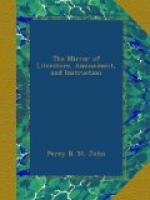In 1817, came forth his great work, on which he was known to have been long engaged, and which if it had been his only production, would have carried his name down to posterity as one of the first bards of his time. “Thoughts that breathe, and words that burn,” would not be an inapplicable motto for this oriental romance, which unites the purest and softest tenderness with the loftiest dignity, and glows in every page with all the fervour of poetry. For the copyright of this poem he is said to have received the sum of 3,000 guineas, and it must have proved a source of immense profit to the publishers.
In 1818, Mr. Moore visited his native city, Dublin, on which occasion our poet was invited to a public dinner, which was graced by a large assemblage of the most distinguished literary and political characters. The Earl of Charlemont took the chair; Mr. Moore sat on his right hand, Mr. Moore, sen. a venerable old gentleman, the father of the poet, was on the left.
On Lord Charlemont proposing “The living Poets of Great Britain,” Mr. Moore said—
“Gentlemen, notwithstanding the witty song which you have just heard, and the flattering elevation which the author has assigned me, I cannot allow such a mark of respect to be paid to the illustrious names that adorn the literature of the present day, without calling your attention awhile to the singular constellation of genius, and asking you to dwell a little on the brightness of each “particular star” that forms it. Can I name to you a Byron, without recalling to your hearts recollections of all that his mighty genius has awakened there, his energy, his burning words, his intense passion, that disposition of fine fancy to wander only among the ruins of the heart, to dwell in places which the fire of feeling has desolated, and like the chestnut-tree, that grows best in volcanic soils, to luxuriate most where conflagration of passion has left its mark? Need I mention to you a Scott, that fertile and fascinating writer, the vegetation of whose mind is as rapid as that of a northern summer, and as rich as the most golden harvests of the south, whose beautiful creations succeed each other like fruits in Armida’s enchanted garden, “one scarce is gathered ere another grows?” Shall I recall to you a Rogers, (to me endeared by friendship as well as genius,) who has hung up his own name on the shrine of memory among the most imperishable tablets there. A Southey, not the laureate, but the author of ’Don Roderick,’ one of the noblest and most eloquent poems in any language. A Campbell, the polished and spirited Campbell, whose song of ‘Innisfail’ is the very tears of our own Irish muse, crystallized by the touch of genius, and made eternal. A Wordsworth, a poet, even in his puerilities, whose capacious mind, like the great pool of Norway, draws into its vortex not only the mighty things of the deep, but its minute weeds and refuse. A Crabbe, who has shown what the more than galvanic power of




